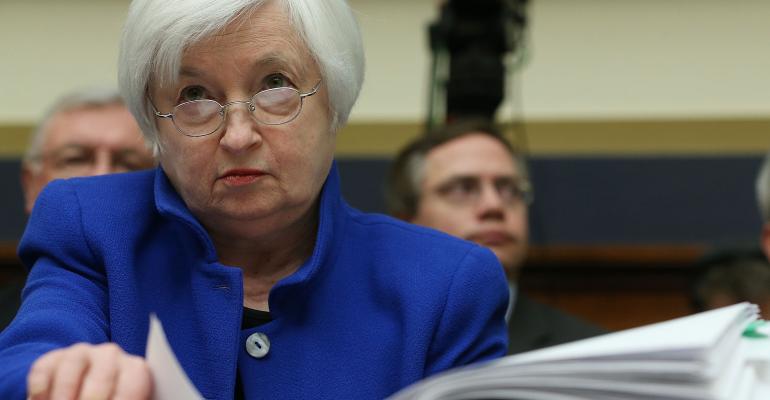Federal Reserve Chair Janet Yellen returned to Congress with a brave face on Thursday amid a worsening meltdown in global markets and growing skepticism the U.S. central bank can carry out its long-planned pivot to "normal" monetary policy.
Testifying for a second straight day before lawmakers, Yellen repeatedly stressed that the Fed is not on a "pre-set path" even though, for now, she still expects it to gradually raise interest rates this year, given the strong U.S. labor market and other bright spots in the economy.
With investors stampeding to safer assets globally, the head of the world's most influential central bank acknowledged that a weakened global economy and a steep slide in stock markets was tightening financial conditions faster than the Fed wants.
As she did at a House of Representatives panel on Wednesday, Yellen on Thursday warned a Senate Banking Committee against jumping to conclusions about the extent of the overseas threat to the growing U.S. economy.
"We are watching developments very carefully," Yellen told the panel of senators. "I would say there is always some chance of a recession in any year. But the evidence suggests that expansions don't die of old age."
But the Fed chief faced a different financial landscape than just a day earlier: Prices of safe-haven U.S. Treasuries soared, with the yield on the benchmark 10-year bond falling to its lowest level in more than three years, while stocks plunged in Asia, Europe and the United States.
Yellen nodded to financial markets concerns as well as the downward pressure that falling oil prices were putting on U.S. inflation, which remains below the Fed's 2 percent target.
"These factors may well influence the balance of risks or the trajectory of the economy and thereby might affect the appropriate stance of policy," she said. "But at this point it's premature to make a judgment on that."
Investors have grown deeply skeptical that the Fed, which raised interest rates in December for the first time in nearly a decade and issued economic projections suggesting another four hikes in 2016, will be able to continue tightening monetary policy in the face of global warning bells that have grown louder since the beginning of the year.
Earlier on Thursday futures traders were pricing in a slight chance of a rate cut this year. But that turned around when Yellen reiterated her view that a cut, while it cannot be ruled out, is "not the most likely scenario." As it stands, traders give an 8 percent chance of a rate hike this year, according to CME FedWatch.
"People have figured out she is trapped," said Stephen Massocca, chief investment officer at Wedbush Equity Management, in San Francisco. "I don't think they will raise rates at all this year – it's 'one and done.'"
GLOBAL CURRENCY WAR
In another sign that central banks' world-wide efforts to boost growth and lending are falling short, the dollar .DXY has tumbled against a basket of currencies including the Japanese yen.
The Bank of Japan last month shocked markets by adopting a negative interest rate, an aggressive move that depressed global bank stocks and spurred U.S. senators to press Yellen on the issue.
Republican Senator Patrick Toomey told her that negative U.S. rates "would put the U.S. deep in the midst of a global currency war which is won by he who debases his currency the most."
While repeating that she expects a gradual rise in U.S. rates, Yellen said the Fed is studying the idea of negative rates because of their adoption elsewhere. "I wouldn't take those off the table," she said.
But Yellen stuck with a belief that strong job creation, rising wages, and solid household spending would keep the U.S. economy afloat. In another sign of strength at home, the Labor Department reported on Thursday that fewer Americans than expected filed for unemployment benefits last week.
Yellen acknowledged that global and U.S. market conditions could upend the Fed's outlook for the economy, suggesting that prospects for further rate hikes rest on how willing the central bank is to react to international pressure.
"When Wall Street threatens Main Street, the reality is that even though the Fed doesn't want to admit that it's the central bank to the rest of the world too, it is," said Diane Swonk, economist and founder of Chicago-based Diane Swonk LLC. "What happens abroad matters."
(Reporting by Jason Lange and Jonathan Spicer; Writing by Jonathan Spicer; Editing by Paul Simao)






